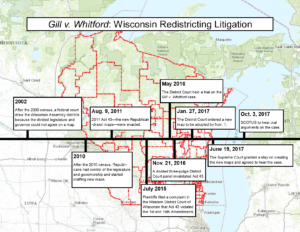Next Tuesday, voters will decide which two judicial candidates to the Supreme Court of Wisconsin will advance to the general primary held on April 3, 2018. The three candidates are Madison attorney Tim Burns, Milwaukee County Circuit Court Judge Rebecca Dallet, and Sauk County Circuit Court Judge Michael Screnock. The seat is currently held by Justice Michael Gableman, who is not seeking re-election.
Although Supreme Court races are officially nonpartisan, Burns and Dallet are seen as the two liberal candidates, while Screnock is considered the conservative. Because turnout for spring elections are typically very low, usually those who do show up to vote are partisans and very few swing voters. Because of that, some expect Dallet and Burns to be battling for the liberal votes, while most expect Screnock to get enough conservative votes to put him into the general election. Yet, with such a low turnout, many election experts say anything can happen, especially if the anti-Trump voters show up in full force next Tuesday.
Below are the campaign websites for all three candidates:

